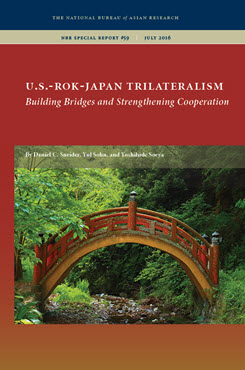Relocating Trilateralism in a Broader Regional Architecture
A South Korean Perspective
This essay considers recent developments in bilateral relations between the Republic of Korea (ROK) and Japan and assesses the opportunities and challenges for U.S.-ROK-Japan trilateralism.
EXECUTIVE SUMMARY
MAIN ARGUMENT
Although historical issues and territorial disputes continue to create mistrust between South Korea and Japan, the landmark December 2015 agreement between Park Geun-hye and Shinzo Abe has the potential to dramatically improve bilateral relations and promote better opportunities for trilateral cooperation with the U.S. In order to deal with the North Korean military threat, well-coordinated trilateralism among the U.S., the ROK, and Japan must be combined with active cooperation from China. Using its reputation as a middle power focused on global issues, South Korea can play a mediating role in regional affairs. The next step for the country is threefold. First, the ROK needs to strengthen trilateralism by improving relations with Japan. Second, it needs to bridge Chinese and trilateral networks. Third, Seoul must prevent the Korean Peninsula from becoming an arena for U.S.-China competition.
POLICY IMPLICATIONS
- South Korea should work to implement a genuine two-track approach vis-à-vis Japan in order to encourage security and economic cooperation between the two countries within the trilateral framework.
- It should deepen partnerships with China and make clear to Beijing that South Korea’s policy toward North Korea targets denuclearization while pursuing peaceful and gradual nonviolent unification.
- The ROK should avoid linking the Korean Peninsula to U.S.-China rivalry by stressing that trilateral military cooperation against the North has little to do with U.S.-China competition but instead aims at ensuring the stability and peace of the peninsula.
Yul Sohn is Dean of the Graduate School of International Studies and Professor of International and Japanese Political Economy at Yonsei University in Seoul.


